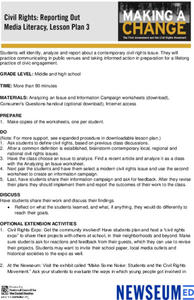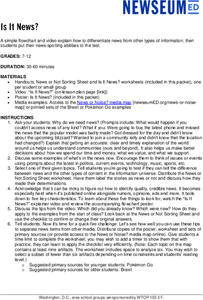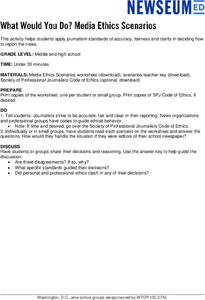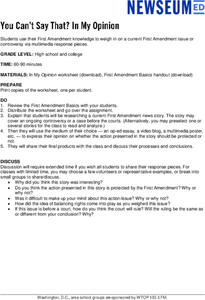NASA
Global Air Temperatures Graph: Student Activity
Analyze years of hard climate change evidence in minutes. Climatologists evaluate graphical data about climate change by answering questions. Scientists work collaboratively using a literacy cube or virtual die that directs them through...
Newseum
Propaganda Through History: Analyzing Historical Sources
Working in teams, pairs, or individually, scholars select one resource from a gallery of historical sources and consider which examples might be considered propaganda, the techniques used to persuade audiences, and evaluate how the...
Newseum
Civil Rights: Reporting Out
After brainstorming a list of contemporary local, regional, and national civil rights issues, pairs of scholars select one of these issues and design an information campaign to spread awareness of the issue.
Newseum
Search Signals: Understanding Your Top Hits
Class members watch a short video about the criteria used to drive search results to learn about how search engines work. Scholars use a "Search Signals" worksheet and a tip sheet to record information as they conduct a simple search of...
Newseum
When Tragedy Hits — Role-Playing a Breaking News Story
Young journalists engage in a role-playing exercise that asks them to consider the journalism and ethical issues raised by the coverage of the mass shootings at Virginia Tech on April 16, 2007. Pupils play the role of either a reporter...
Newseum
Covering a Catastrophe: Evaluating Disaster News
Young journalists investigate the various ways to share news about a disaster and evaluate the pros and cons of each of these types of news. Individuals then select two different forms of media reports of a recent disaster. Using the...
Newseum
'The Press and the Civil Rights Movement' Video Lesson
Scholars watch a video featuring journalists who covered the civil rights movement, then respond to questions on a viewing guide. The video features interviews with participants and original news footage from the 1950s and 1960s. In...
Newseum
Is It News?
Is it news or not? That is the question young journalists must consider in a lesson about newsworthiness. Class members watch a short video that details five key characteristics of quality, credible news. Individuals then use these tips...
Newseum
From the Front Page to the History Books
Young journalists compare news coverage of four major events with how the same events are covered in historical accounts. The ensuing discussion asks class members to compare and contrast the role of a reporter and the role of a historian.
Newseum
Journalists Code of Ethics
Journalists are supposed to adhere to a Code of Ethics. To determine the degree to which reporters follow this code, individuals select three recent stories with photographs from newspapers, magazines, online news sites, or television...
Newseum
Disinformation Nation: Separating Politics and Propaganda
Separating political rhetoric from propaganda is no small feat. Class members are challenged to examine two different sources about a candidate in an upcoming election and determine whether the primary purpose of the source is to inform...
Newseum
Reporting Part III: Staying Objective
The third and final lesson in the Reporting series tests young journalists' ability to be objective in reporting contentious topics. After brainstorming a list of contentious topics that interest them, the class selects one, and...
Newseum
Reporting Part II: Beyond the Basics
Scholars examine the articles written for the series' first lesson plan and select ones that would benefit from further research. In a 48-hour deadline, teams of three select one topic to investigate in greater depth and craft a revised...
Newseum
Reporting Part I: What Matters to Me
Young reporters have an opportunity to craft a news story about a topic that interests them. Class members brainstorm events and issues that affect them and possible sources of information. Individuals then select a topic, research it,...
Weber County Library
Weber Reads: The Adventures of Huckleberry FInn
A 32-page instructional pack contains eight lesson plans for use with The Adventures of Huckleberry Finn. Lessons include an examination of the role of superstition in the novel, Twain's use of satire, and a discussion of the...
Digital Public Library of America
The Adventures of Huckleberry Finn by Mark Twain
Mark Twain's The Adventures of Huckleberry Finn is the focus of a teaching guide that introduces readers to some of the many controversies surrounding the use of the novel in classrooms. The packet includes 15 primary source excerpts and...
Discovery Education
Writing about Symbolism and Emotion in Huckleberry Finn
To complete a study of The Adventures of Huckleberry Finn, readers select a well-known quotation or symbol from the novel to use in an essay that analyzes how the quotation or symbol relates to the novel's themes.
Simon & Schuster
Curriculum Guide to: Adventures of Huckleberry Finn by Mark Twain
Five lessons make up a curriculum guide to The Adventures of Huckleberry Finn. Readers find examples of Twain's use of irony, closely examine Huck's colloquial language, as well as his sense of morality, and identify themes in the novel....
Utah Education Network (UEN)
Lessons Learned in Adventures of Huckleberry Finn
To conclude a study of The Adventures of Huckleberry Finn, class members create illustrated newsletters about Huck's lessons as he journeys down the Mississippi River. Using Microsoft Publisher, pairs copy, save, and import illustrations...
Newseum
Civil Rights: Chronicling the Movement
Scholars investigate events in the civil rights era in their community and develop a multimedia presentation of their findings. They compare local events with national events discussed on a NewseumED timeline.
Newseum
Compare Coverage of Brown v. Board Ruling
Young journalists analyze how The Topeka State Journal, the Jackson Daily News, and The Providence Journal reported on the 1954 Supreme Court decision in Brown v Board of Education. Scholars scrutinize the headlines, photographs,...
Newseum
Civil Rights News Coverage: Looking Back at Bias
Not all southern newspapers covered the civil rights movement of the 1950s and 1960s. Young journalists investigate how The Lexington (Ky. Herald-Leader and The Jackson (Tenn.) Sun re-examined their coverage of the movement. After...
Newseum
What Would You Do? Media Ethics Scenarios
Young journalists are presented with scenarios that involve media ethics. They must decide in each case whether to cover the story, what they would cover, and if covered, what the angle would be.
Newseum
You Can’t Say That: In My Opinion
As a part of a study of the First Amendment, high schoolers research a current news story that seems to involve one of the freedoms granted by the First Amendment. Investigators decide whether they think the action presented in the story...

























